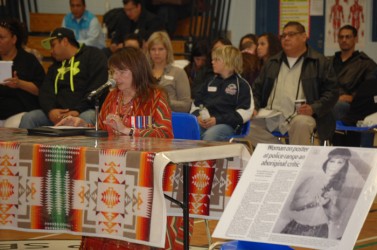Article Origin
Volume
Issue
Year
Alberta Chiefs want a national inquiry in to murdered and missing Aboriginal women and girls but they won’t be getting support from the province’s new premier.
The Assembly of Treaty Chiefs passed the resolution to move forward with the national inquiry the day after Premier Jim Prentice said there was no need.
“I’m not convinced that an inquiry is what we need to do at this point,” said Prentice in his first news conference since taking office as the Conservative’s new leader. “I’m not opposed to an inquiry but I actually think we know what we need to know… so I prefer that we get on with solutions rather than studies at this point.”
“He never consulted with us, never talked to us as to what we thought,” said Driftpile First Nation Chief Rose Laboucan. “There was no meeting. He hadn’t done his homework yet. He hadn’t done all the things he needed to do to make that decision.”
The resolution, passed unanimously by Alberta Chiefs, recognizes “the direct impact that the murdered and missing Indigenous men and women have on the family system and the large proportion of children in care,” which it says “reflects the sociological and systemic issues adversely facing First Nations people in Canada.”
“I think (Prentice) is going to be a premier that the prime minister is going to enjoy,” said Laboucan. “He’s got the same views in a lot of cases in a lot of situations, on the issues we have.”
Prentice stands as the lone premier in support of Harper’s stand to not hold a national inquiry. Prentice served as federal minister for Indian Affairs and Northern Development in 2006-2007 under Harper. When Prentice announced his new smaller Cabinet on Sept. 15, he held on to the portfolio of Aboriginal Relations. He appointed Edmonton Gold Bar MLA David Dorward as associate minister for Aboriginal Relations.
Muriel Stanley Venne, president and founder of the Institute for the Advancement of Aboriginal Women, whose board is in support of a national inquiry, is disappointed with Prentice’s position. She recalled that when Prentice was federal minister she was present when he received a “scathing, scathing report” from the Native Women’s Association of Canada.
She says she finds his stand now “very disturbing … that his dismissal or flippant way of describing the need for an inquiry was just terrible. Of course we need solutions, but until we realize the comprehensive injustice that was done toward the Indigenous people of this country, this is only part of it.”
In May, the RCMP released a report indicating that 1,017 Indigenous women had been murdered and another 164 missing between 1980 and 2012. That combined figure is close to double the over 600 cases of missing and murdered Indigenous women and girls that NWAC and Sisters in Spirit have documented in the past 30 years. In September, a newly disclosed Public Safety Canada study indicated that Aboriginal women and girls are prime targets for human traffickers because they are more likely to suffer from poverty, drug addictions and mental-health problems.
“Trafficking is only based on poverty and desperation,” said Venne.
Venne, who is reading journalist Stevie Cameron’s account of the Pickton murder trial in the book “On the Farm,” said of that particular investigation, “The whole thing is prejudiced by the fact that those women were prostitutes, most of them. The police put no value whatsoever on them.”
But criticism does not lie with the Vancouver police alone. Venne says similar concerns have been raised with police chiefs across the country.
“It’s a national shame. This is the most shameful act of non-attention to the lives of Aboriginal women,” said Venne. “The cause of it is the racism, the prejudice, and the discrimination against Indigenous women of this country. That’s what the inquiry would bring out.”
She adds that Prentice reconsidering his stand would be a “very important step in the reconciliation of Indigenous people to the people of Canada.”
A national inquiry is necessary to understand what has happened, says Laboucan.
“Unless they have the inquiry and invest into a real honest process, that once we know the truth, we can address it. Maybe it’ll even cost less to the taxpayers in the long run. Who’s to say? We haven’t had one,” she said.
Laboucan also questions why Harper and now Prentice are opposed to a national inquiry.
“What are they hiding?” she asked. “Why don’t they want to get to the truth and figure this all out?”
Photo caption: Muriel Stanley Venne displayed a target poster once used by Saskatoon police when she made a presentation to the United Nations rapporteur last year calling for a national inquiry on murdered and missing Aboriginal women and girls.
- 1769 views

